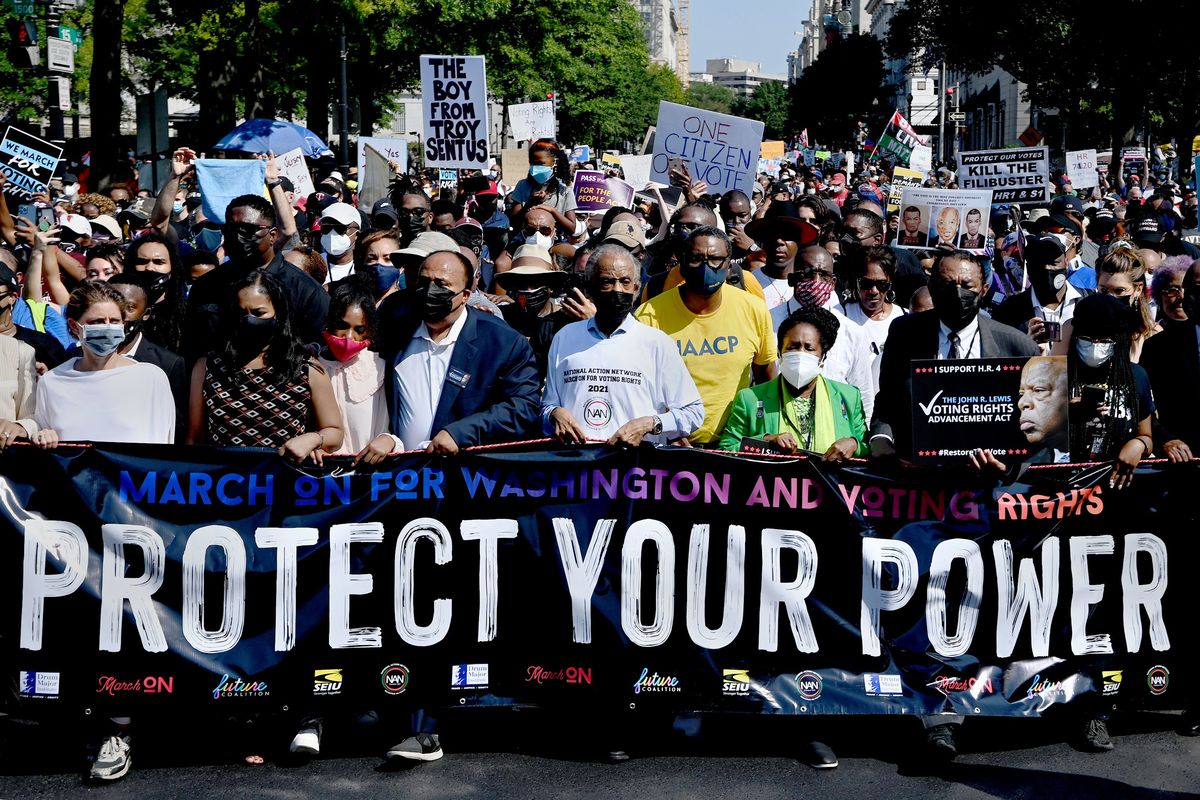King family announces coalition to aid Black, Brown organizers

Nearly 60 years after the Rev. Martin Luther King Jr. stood at the Lincoln Memorial and delivered his seminal “I Have a Dream Speech,” relatives say his vision is far from realized.
Instead of marching on the nation’s capital this anniversary, Martin Luther King III and his wife, Arndrea Waters King, are focusing their efforts on Black and Brown organizers in communities across the country. They announced on Sunday the launch of a coalition that will invest millions of dollars in 40 groups that promote freedom, justice and equality – a recognition of the ways great social movements harnessed the power of grass-roots organizing to achieve progress.
“What I learned a long time ago, even my father’s campaigns, they really were marathons. And so this is a marathon,” said Martin Luther King III, the late civil rights leader’s elder son. “It is those individuals, those community organizations, that are working every day in the trenches that ultimately have the capacity, if they’re fully funded, to make tremendous impacts.”
The King family is also looking ahead to next year and asking people to join them in D.C., the weekend of Aug. 26, 2023, to mark the 60th anniversary of the March on Washington.
The Drum Major Coalition will be a partnership between influential, wealthy leaders and community organizers, the King family said. It will launch with $5 million from members like actor Ben Stiller, Slack co-founder Cal Henderson and billionaire cryptocurrency investor Michael Novogratz, according to a news release. Those funds will be distributed among 40 organizations, and the family hopes to expand the coalition to include a roster of 200 members who can contribute $100 million by 2024.
The groups the coalition will support include those that register Black voters, educate Latino evangelical communities on the issues that matter to them, and advocate for the restoration of voting rights for people with a felony conviction. Arndrea Waters King said she hopes this investment helps build power and infrastructure among Black and Brown community groups that are often underfunded.
The investments into Black- and Brown-led community organizations comes ahead of the November midterm elections. The results will determine which party controls Congress, how much power election deniers could secure in key battleground states ahead of the 2024 presidential elections, and the future of abortion access in states like Pennsylvania and Michigan, where Democratic governors have blocked antiabortion legislation proposed or passed by Republican-led legislatures.
“Right now,” Arndrea Waters King said, “our democracy is in peril.”
Arndrea Waters King also referenced Martin Luther King Jr. and Coretta Scott King’s dream of a “beloved community,” where people can “live and work and thrive, unencumbered.”
“The best way to realize the dream, build the beloved community,” she said, “is to help facilitate these groups on the ground that are organizing their communities every single day.”
Martin Luther King III and Arndrea Waters King also said they worry about the GOP’s national push to enact hundreds of new election restrictions that they say would erode participation in the country’s democracy. They hope consistent funding in groups that are educating, registering and encouraging voters to cast their ballots will empower people who are too often overlooked and disenfranchised.
Agustin Quiles said politicians and racial, social and economic justice advocates all seem to ignore the Latino evangelical community.
The funding his Orlando-based organization, Mission Talk, will receive from the coalition will help his group continue educating voters on issues like health care, affordable housing, criminal justice reform and poverty – and mobilize them to cast their ballots.
“When they hear the word ‘evangelical,’ they assume this community is Republican. And for the most part, this community is really in proximity to the pain and has been ignored by different justice movements, even by politicians,” Quiles said. “It’s a community that not a lot of people understand. … We’re not monolithic.”
LaTosha Brown, the co-founder of Black Voters Matter, said she plans to use coalition funds to education people around civic engagement, including voter registration, and to bolster efforts in states where the organization sees “the height of voter suppression strengthen,” like Georgia, Florida and Texas.
“We are at a defining moment in American democracy,” Brown said. “If we will go forward with a multiracial, multigenerational coalition of people who want democracy. Or whether we will let this system be destroyed by those who seek to maintain power at the expense of disenfranchising and terrorizing the rest of us.”
The support from the coalition will also aid Daryl Atkinson as he travels to communities across North Carolina to hold registration events.
Atkinson, co-director of Forward Justice, a civil rights group in Durham, N.C., was the lead attorney who filed a lawsuit challenging a state law that restricted when people serving felony community supervision could regain their voting rights. His team argued the law was designed to discriminate against Black people and prevent them from exercising political power at the ballot box. North Carolina judges ruled in their favor in 2021, ordering the restoration of voting rights for thousands of people with a felony conviction. The case has been appealed and is now before the state’s Supreme Court.
As a person who was formally incarcerated, Atkinson knows the barriers people face upon release. A criminal record, he said, holds people back, denying them access to housing, employment and other resources needed to succeed. He said his driver’s license was automatically suspended and he was denied federal financial student aid.
“Our biggest fights in this country have really been about who’s included in that ‘we’ in ‘we the people.’ At one point, African Americans weren’t included. At one point, women weren’t included,” Atkinson said. “History shows us that our democracy is stronger when more people can participate. Every single time that we’ve expanded the franchise, our democracy has become stronger, our society has become better.”